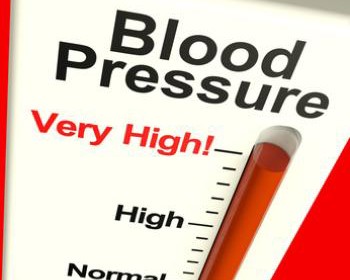In the United States, 1 in 3 adults have high blood pressure – that’s approximately 70 million American adults, says the Centers for Disease Control and Prevention (CDC). And of those people, only half are actively managing their blood pressure. Add another 70 million adults who have prehypertension and you’ve got a lot of people who have or are at risk for high blood pressure.
Why Is Hypertension Such a Big Deal?
According to the CDC, in 2013 more than 360,000 deaths included high blood pressure as the main contributing cause. Hypertension increases your risk for:
- Hardening of the arteries
- Heart attack
- Stroke
- Chest pain, also called angina
- Chronic heart failure
- Kidney disease
So it can really put a wrench in your longevity and quality of life if it isn’t managed. But what is a healthy blood pressure level? You should strive for a systolic (top number) of less than 120 mmHg and a diastolic (bottom number) of less than 80 mmHg. Check out the American Heart Association’s blood pressure guidelines here.
How to Keep the Pressure Down
If you’re looking to avoid the side effects of prescription medications to manage blood pressure, you’re not alone. The Mayo Clinic advises combining effective lifestyle strategies that will help manage and also prevent it in the first place:
- Choose foods like an Olympic athlete. Give your body high quality fuel by loading your plate at each meal with vegetables, fruit, whole grains, and lean protein. Also eat plenty of foods with potassium, like squash and spinach. Potassium has been shown to improve blood pressure levels.
- Sidestep salt, trans fats, and saturated fats. Eat less than 2,300mg of salt daily and limit trans and saturated fats from your diet. Too much salt and these types of fats promote hypertension. Processed foods and packaged baked goods are the biggest offenders to steer clear.
- Engage in fun activities and stay at a healthy weight. If you’re inactive, exercise promotes healthy blood pressure levels. Do something you enjoy at least 150 minutes every week. And for those who are overweight, losing just 5 pounds can help lower your blood pressure.
- Don’t drink alcohol or smoke. Both of these habits increase blood pressure levels. And even if you’re healthy, alcohol can increase it. As for tobacco, it injures the blood vessel walls and speeds up hardening of the arteries which then increases your risk for heart disease and stroke.
- Kick stress to the curb. Carve out some quiet time each day to do some gentle, slow breathing to help you relax. Exercise is also a great stress reliever.
Link Between Blood Pressure and Seasonality
Chinese medicine understands that hypertension is directly linked when specific organs – such as the kidneys or liver – are out of balance during a specific season. Environmental factors impact heart and cardiovascular performance and can be different for each person. This may mean you only need to support your system during a certain part of the year, instead of being medicated year-round. A licensed expert in Chinese medicine can determine if that’s the case. The good news is, besides lifestyle changes, there are two forms of Chinese medicine that are beneficial in the management of high blood pressure and can improve the function of the kidneys, liver, heart, and digestive system:
Acupuncture: This is Chinese medicine’s first line of defense for high blood pressure. Several studies have shown its effectiveness in managing the condition.
Chinese herbs: Common prescription medications – such as ACE inhibitors, diuretics, and Beta blockers – are known to produce side effects including cough, dizziness, gout, and nausea. But another option is a customized herbal formula by a qualified Chinese herbalist that can help regulate blood pressure. And the added benefit? These can be taken safely without side effects versus prescription drugs. When coupled with a healthy lifestyle, acupuncture and herbs help to balance the organs and relax the cardiovascular system in an effort to promote normal blood pressure levels.

